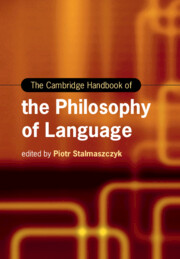Book contents
- The Cambridge Handbook of the Philosophy of Language
- Cambridge Handbooks in Language and Linguistics
- The Cambridge Handbook of the Philosophy of Language
- Copyright page
- Contents
- Figures
- Tables
- Contributors
- Preface
- 1 Philosophy of Language: Definitions, Disciplines, and Approaches
- Part I The Past, Present, and Future of Philosophy of Language
- Part II Some Foundational Issues
- 5 Philosophy of Language, Ontology, and Logic
- 6 Frege’s Legacy in the Philosophy of Language and Mind
- 7 Metasemantics and Metapragmatics: Philosophical Foundations of Meaning
- 8 Internalist Perspectives on Language
- 9 Semantic Content and Utterance Context: A Spectrum of Approaches
- 10 Semantic Minimalism and Contextualism in Light of the Logicality of Language
- Part III From Truth to Vagueness
- Part IV Issues in Semantics and Pragmatics
- Part V Philosophical Implications and Linguistic Theories
- Part VI Some Extensions
- References
- Index
7 - Metasemantics and Metapragmatics: Philosophical Foundations of Meaning
from Part II - Some Foundational Issues
Published online by Cambridge University Press: 12 November 2021
- The Cambridge Handbook of the Philosophy of Language
- Cambridge Handbooks in Language and Linguistics
- The Cambridge Handbook of the Philosophy of Language
- Copyright page
- Contents
- Figures
- Tables
- Contributors
- Preface
- 1 Philosophy of Language: Definitions, Disciplines, and Approaches
- Part I The Past, Present, and Future of Philosophy of Language
- Part II Some Foundational Issues
- 5 Philosophy of Language, Ontology, and Logic
- 6 Frege’s Legacy in the Philosophy of Language and Mind
- 7 Metasemantics and Metapragmatics: Philosophical Foundations of Meaning
- 8 Internalist Perspectives on Language
- 9 Semantic Content and Utterance Context: A Spectrum of Approaches
- 10 Semantic Minimalism and Contextualism in Light of the Logicality of Language
- Part III From Truth to Vagueness
- Part IV Issues in Semantics and Pragmatics
- Part V Philosophical Implications and Linguistic Theories
- Part VI Some Extensions
- References
- Index
Summary
Meta-level discussions can concern different basic-level objects: the meta- prefix (Greek for ‘after’, ‘behind’, ‘among’, ‘higher’, ‘beyond’, ‘above’, ‘transcending’, ‘with’) combines comfortably not only in the well-acknowledged “metaphysics,” but in our times with metamathematics, metahistory, metaethics, metalanguage, metacommunication, metasemiotics, metapragmatics, metasemantics, metasyntax, metaknowledge, metaculture, metadata, metacognition, metaexistence, and so forth, enjoying formidable productivity. The compounds display somewhat less consistent compositionality in that the meta-level, arguably always metaphorically (no pun intended) “higher” in some sense than the basic/object level, is sometimes just a level of discourse or description pertaining to “meta-x about an x,” while at other times, more precisely, “meta-x providing the foundations, including methods and justification, for x.”
- Type
- Chapter
- Information
- The Cambridge Handbook of the Philosophy of Language , pp. 139 - 156Publisher: Cambridge University PressPrint publication year: 2021
- 2
- Cited by

